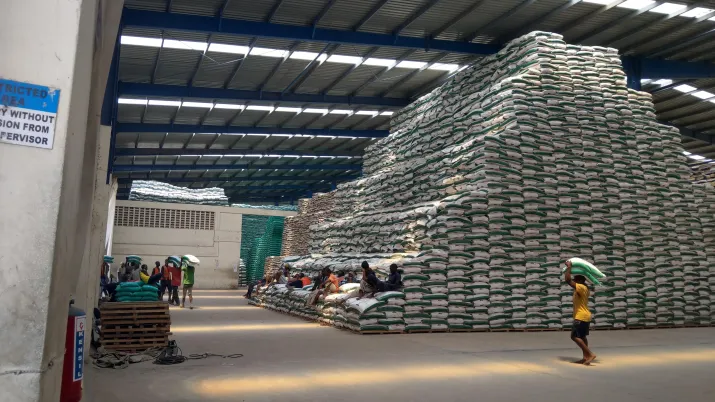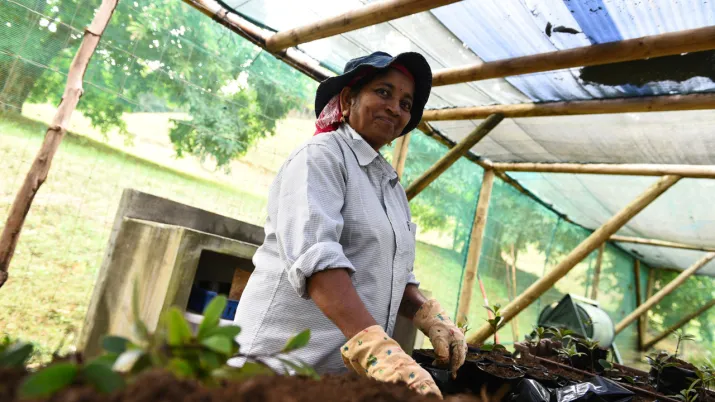News
Equity investment to bring SMEs to scale: An interview with two African fund managers
SMEs in Africa remain heavily reliant on internal resources and traditional bank debt. A lack of appropriate forms of finance – especially of the equity type – limits market entry, long-term investmen...
Published on

“As you are encouraging the farmers to grow tea, you must be able to give them extension services”
At the head of the Kenya Tea Development Agency (KTDA), Kenya's leading tea producer and exporter, Lerionka Tiampati discusses, for the Private Sector & Development review, the successes and challenge...
Published on

Complementarity between agro-industry and smallholders in Sub-Saharan Africa
By providing jobs, technical assistance and development projects to village communities, industrial groups strengthen their economic and social well-being – and can complete their production with the...
Published on

Understanding SMEs in developing countries to meet their needs more effectively
There is now universal agreement on the crucial role of SMEs – which comprise the bulk of businesses in developing countries – particularly in creating jobs. Nevertheless, there are many different – s...
Published on

“Investment in agriculture as a key poverty reduction lever”
The World Bank’s World development report was first published in 2008. It was co-written by Alain de Janvry and Elisabeth Sadoulet among others and it highlighted agriculture as “an essential developm...
Published on

Promoting local agricultural production in an emerging country: the example of Les Vergers du Mékong
By promoting the fruit, coffee and tea production of smallholders in Vietnam, which is subsequently processed locally into products with high added value, Les Vergers du Mékong ensures profitability w...
Published on

Agriculture: Nigeria’s job creation engine
Unemployed youth in Nigeria are estimated at over 60%. As this figure increases, so does the risk of insurgencies. The solution could come from agriculture; yet young smallholders face the problem of...
Published on

Strengthening value chains in Africa: conditions for sustainable contractual arrangements
Africa continues to suffer from extreme poverty and malnutrition and the agri-food sector faces numerous challenges. Contract farming can boost value chain efficiency by enhancing coordination between...
Published on

Using the Theory of Change to optimize the investment impact
Agricultural programmes are a preferred instrument to achieve positive impact on local communities. Today’s DFIs, including Proparco, are looking for financial results but also aim to achieve economic...
Published on

Under what conditions do labels support development? The example of coffee
The coffee sector, a source of income for 25 million producers around the world, is faced with social and environmental challenges which have led to it being a focus of attention for certifications an...
Published on

The role of agribusiness in development: a long-standing debate
Agribusiness and its role in economic development has given rise to much debate. Although it is frequently perceived in terms of negative externalities, it remains a solid vector for creating jobs and...
Published on

Good governance: a framework for sustainable performance
The establishment of good governance is fundamental to the success of any company. The emerging markets start-up Jumo operates in Africa and Asia and has adopted a holistic approach to corporate gover...
Published on

Corporate governance: journey of a Kenyan bank
I&M's corporate governance structures have evolved considerably, driven in particular by the regulatory framework and I&M's aspiration to professionalize and enhance its governance framework. As acqui...
Published on

Promoting good corporate governance: the Peruvian experience
“Good corporate governance guidelines for Peruvian companies” were published in July 2002 with the aim of strengthening and enhancing governance in the country’s businesses. Ten years later it appeare...
Published on

INAD-CI, an association of company directors promoting good governance
The National Institute of Directors of Côte d’Ivoire (Institut national des administrateurs de Côte d’Ivoire – INAD-CI) was set up in April 2013 by a group of corporate executives and professional org...
Published on

Reforming governance in pursuit of growth: the case of Adenia and Opham
Adenia Partners is closely involved in the day-to-day management of its investees. In particular, it has partnered Opham, a Malagasy pharmaceutical products distributor, and recast its corporate gover...
Published on

Good governance practices: Organizing business succession
Not planning your succession often means planning the failure of its transfer. Consequently, a successful transfer generally entails a successful planning of the succession. To achieve this, this plan...
Published on

Taking over at the helm of a company: duties, challenges and solutions
The issue of taking over at the helm of a company has long been – and is still today – a taboo in Africa. When the time comes to appoint a successor, it is often perceived as being the end of the worl...
Published on

An example of commitment to good governance: DFIs and corporate governance support
With the collaboration of the CGDF Working Group: Marta Viegas-Rocha (IDB Invest), President; Sanaa Abouzaïd (SFI); Elisabeth Alpe (ADB); Vassilis Christakis (BSTDB); Andres Oneto (CAF); Shirley Payet...
Published on

Good governance: accelerating growth and sustainable development
Good governance principles and a management infrastructure are vital to reflection on sustainable development requirements and to ensuring they are properly applied. It is the very essence of a partic...
Published on

